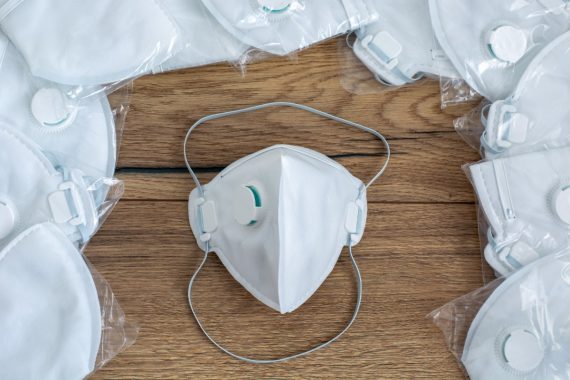IPC update says GPs seeing patients with ‘suspected’ Covid should wear FFP3

Updated infection prevention and control (IPC) guidance has suggested that GPs treating patients with a ‘suspected or confirmed’ Covid infection must wear an FFP3 mask.
However, this is in direct contrast with NHS England advice to GPs last week that they should not routinely wear respiratory protective equipment (RPE) such as FFP3s or FFP2s in primary care.
The UK Health Security Agency (UKHSA) said on Monday that the IPC guidance had been updated to ‘clarify’ the ‘wording around RPE’.
UKHSA and NHS England jointly manage the IPC guidance, along with Public Health Wales and the Northern Ireland Public Health Agency.
The updated guidance said: ‘A respirator with an assigned protection factor (APF) 20, that is, an FFP3 respirator (or equivalent), must be worn by staff when… caring for patients with a suspected or confirmed infection spread by the airborne route (during the infectious period).’
It must also be used when performing aerosol-generating procedures (AGPs) on the same cohort of patients, it added.
Is Covid classed as an ‘infection spread by the airborne route’?
While the IPC guidance does not explicitly state that Covid is airborne, separate UKHSA guidance on Covid epidemiology, virology and clinical features has said this.
The document said: ‘SARS-CoV-2 is primarily transmitted between people through respiratory particles (droplet and aerosol) and indirect contact through fomite transmission (contact with contaminated surfaces).
‘When someone with Covid-19 breathes, speaks, coughs or sneezes, they release droplet or aerosol particles containing SARS-CoV-2. Aerosol particles can also be released when certain procedures or support treatments are performed in health and care settings.’
It added: ‘A person can be infected when these particles are inhaled, or come into contact with the eyes, nose or mouth.’
The IPC guidance itself defines airborne transmission as ‘the spread of infection from one person to another by airborne particles (aerosols) containing infectious agents’.
But GPs were told at NHS England’s latest GP webinar that wearing RPE such as FFP3 masks routinely is not ‘something you want to do in primary care’ and is ‘not necessarily required’.
A representative from the national infection prevention and control team said GPs should only use FFP3 face masks if a risk assessment deems there to be an ‘unacceptable risk’ of transmission, or they are carrying out an AGP.
The ‘majority’ of healthcare workers should wear a ‘Type II surgical face mask for all patient contact’, which give ‘very good protection’, they said.
GPs were also told that they should not routinely use FFP2 respirators, but should only do so if they have been risk assessed as needing a higher-grade FFP3 but this is unavailable.
It followed BMA advice last month that GPs should wear FFP2 face masks ‘as default’ when consulting patients face to face to protect against the highly-infectious Omicron Covid variant.
An NHS England spokesperson told Pulse on background that it is not giving separate guidance to primary care and that its advice is to follow the IPC guidance.
Pulse also approached UKHSA for comment, but was redirected to NHS England’s IPC cell.
Meanwhile, an NHS England GP bulletin sent to practices on Thursday reiterated that GPs can access FFP3s via the Government’s PPE portal if practices have ‘undertaken the necessary risk assessments and arranged for staff to have been fit tested before ordering the equipment’.
It stressed that fit-testing is a legal requirement on employers for all tight-fitting RPE such as FFP3 masks.
Responding to the updated IPC guidance, BMA occupational medicine co-chair Professor Raymond Agius said: ‘Almost two years into the pandemic and after tireless campaigning by the BMA, it is good to see that the IPC guidance relating to RPE has been changed to reflect undeniable evidence that Covid-19 spreads through the air.’
BMA GPC England deputy chair Dr Kieran Sharrock added: ‘We’re pleased that NHSE/I is now advising that GPs should have RPE and that they’ll be able to order this through the portal, alongside fit testing.’
The BMA has published preliminary guidance around how to risk assess which type of face mask is needed, including both FFP2s and FFP3s, with more to follow.
It had written to the Government to demand higher-grade PPE to protect GPs and their staff against Omicron, with Pulse reporting that GPs were forced to buy their own higher-grade PPE to protect staff.
Additional reporting by Caitlin Tilley
Pulse October survey
Take our July 2025 survey to potentially win £1.000 worth of tokens

Visit Pulse Reference for details on 140 symptoms, including easily searchable symptoms and categories, offering you a free platform to check symptoms and receive potential diagnoses during consultations.
Related Articles
READERS' COMMENTS [2]
Please note, only GPs are permitted to add comments to articles










Boris and the Queen are giving the army medals for soldiers and the Kabul fiasco. You on the other hand, well, yes…are waiting for a KitKat.
The current GovUK narrative that Covid doesn’t exist anymore, we live with uncertainty and zero public health and that the UK beat nature by a “common no-sense” zero plan approach, wont need an FFP3. It’ll need CBT and hope.